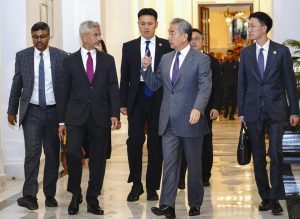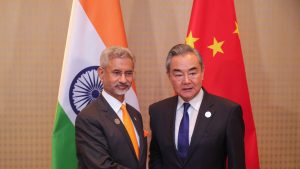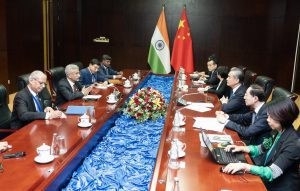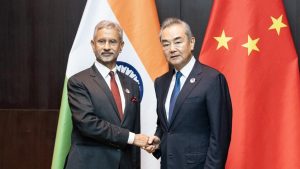New Delhi – The Jaishankar Wang LAC Talks commenced in New Delhi on Monday, August 18, 2025, marking the first high-level ministerial engagement between India and China since the Xi-Modi Kazan summit. External Affairs Minister S. Jaishankar emphasized the urgent need for troop withdrawal processes to “move forward” during discussions with Chinese Foreign Minister Wang Yi at the official venue, Hyderabad House.
This significant diplomatic engagement represents a crucial step in normalizing bilateral relations after years of military tensions along the disputed border. The Jaishankar Wang LAC Talks serve as preparatory discussions for Prime Minister Narendra Modi’s upcoming visit to China for the Shanghai Cooperation Organisation summit scheduled for the end of August 2025.
De-escalation Imperative at Center of Discussions

During the Jaishankar Wang LAC Talks, Minister Jaishankar delivered pointed remarks about the necessity of advancing the de-escalation process along the Line of Actual Control. “Having seen a difficult period in our relationship, our two nations now seek to move ahead,” Jaishankar stated in his opening remarks to the Chinese delegation.
The External Affairs Minister stressed that “the basis for any positive momentum in our ties is the ability to jointly maintain peace and tranquillity in the border areas.” He specifically highlighted that “it is also essential that the de-escalation process move forward,” drawing attention to incomplete demobilization efforts at the LAC despite ten months having passed since the leaders’ Kazan meeting.
Comprehensive Agenda for Special Representative Talks


The Jaishankar Wang LAC Talks are setting the stage for the 24th round of Special Representative discussions scheduled for Tuesday, August 19, 2025. Wang Yi will meet National Security Advisor Ajit Doval for focused negotiations on boundary dispute resolution between the two Asian powers.
Also Read: Trump Putin Zelensky Meeting; Breakthrough Leads To Historic Peace Talks
According to Beijing’s Foreign Ministry spokesperson Mao Ning, the Special Representatives aim to advance discussions from their previous round, covering “delimitation negotiations, border management, mechanism building, and cross-border exchanges and cooperation.” The Jaishankar Wang LAC Talks provide essential groundwork for these comprehensive boundary resolution efforts.
Prime Minister Modi’s Strategic Engagement
In a significant diplomatic gesture, Prime Minister Modi is expected to meet Wang Yi on Tuesday evening, ahead of his crucial meetings with Chinese President Xi Jinping at the SCO summit in Tianjin. This anticipated encounter during the Jaishankar Wang LAC Talks visit underscores the high-level commitment to restoring India-China relations.
The two leaders last met in October 2024 in Kazan, where they agreed to normalize bilateral ties following a four-year military standoff at the LAC. Wang Yi’s current Delhi visit represents the first ministerial-level engagement since that historic Kazan summit, making the Jaishankar Wang LAC Talks particularly significant for future diplomatic progress.
Outstanding De-escalation Challenges
Despite positive momentum in other bilateral areas, the Jaishankar Wang LAC Talks highlighted persistent challenges in completing the de-escalation process. Jaishankar specifically noted that demobilization at the LAC and dismantling of military infrastructure to restore the pre-April 2020 status quo remain incomplete, even as other aspects of the relationship have shown improvement.
The External Affairs Minister’s emphasis on moving the de-escalation process forward during the Jaishankar Wang LAC Talks reflects India’s position that sustainable bilateral progress requires complete resolution of border tensions. This stance underscores the critical importance of addressing military concerns alongside diplomatic and economic cooperation.
Restoration of Bilateral Cooperation Mechanisms


The Jaishankar Wang LAC Talks occur against the backdrop of gradual restoration in various cooperation areas between the two countries. In June 2025, China and India resumed the Kailash Mansarovar Yatra for Indian pilgrims, marking a significant step in normalizing religious and cultural exchanges.
Additionally, India has resumed issuing tourist visas for Chinese visitors, while both sides are actively discussing the resumption of sharing river water data. The Jaishankar Wang LAC Talks also addressed plans for restarting direct flights between India and China, which have remained suspended since 2020 due to bilateral tensions and global circumstances.
Chinese Commitment to Constructive Dialogue


Beijing’s response to the Jaishankar Wang LAC Talks demonstrated commitment to continued diplomatic engagement. Foreign Ministry spokesperson Mao Ning confirmed that China “stands ready to continue the in-depth communication” with India, maintaining a “positive and constructive attitude” toward bilateral discussions.
This Chinese position, articulated ahead of the Jaishankar Wang LAC Talks, signals potential flexibility in addressing outstanding border issues while advancing broader bilateral cooperation. The commitment to constructive dialogue provides an encouraging foundation for the Special Representative talks and future high-level engagements.
Strategic Implications for Regional Stability
The Jaishankar Wang LAC Talks carry significant implications for regional stability and the broader strategic landscape in Asia. Successful de-escalation and normalization of India-China relations could positively impact regional security dynamics, trade relationships, and multilateral cooperation mechanisms including the SCO, BRICS, and other forums where both nations participate.
As the largest and most populous nations in Asia, progress achieved through initiatives like the Jaishankar Wang LAC Talks extends beyond bilateral concerns to influence regional and global stability. The international community closely monitors these diplomatic efforts, recognizing their potential impact on broader geopolitical dynamics.
Future Trajectory and Expectations
The success of the Jaishankar Wang LAC Talks will likely determine the trajectory of India-China relations in the coming months. With Prime Minister Modi’s SCO summit participation and the ongoing Special Representative dialogue process, these initial discussions establish crucial momentum for comprehensive bilateral normalization efforts that address both immediate border concerns and long-term strategic cooperation opportunities.

